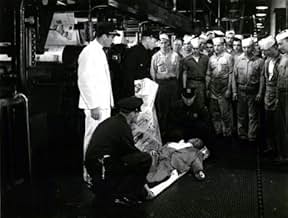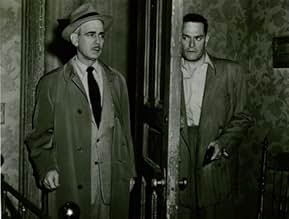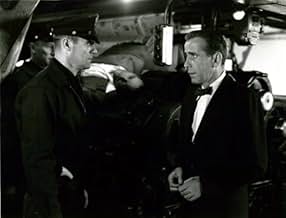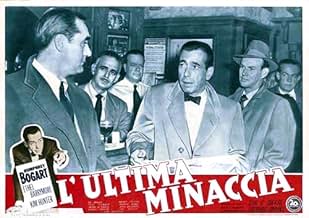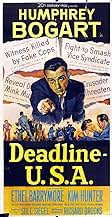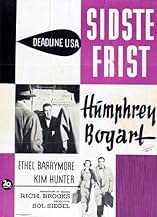ÉVALUATION IMDb
7,2/10
4,6 k
MA NOTE
Alors que son journal est sur le point d'être vendu, le rédacteur en chef de la croisade Ed Hutcheson tente de terminer un exposé sur le gangster Rienzi.Alors que son journal est sur le point d'être vendu, le rédacteur en chef de la croisade Ed Hutcheson tente de terminer un exposé sur le gangster Rienzi.Alors que son journal est sur le point d'être vendu, le rédacteur en chef de la croisade Ed Hutcheson tente de terminer un exposé sur le gangster Rienzi.
- Prix
- 2 victoires au total
Joe De Santis
- Herman Schmidt
- (as Joseph De Santis)
Parley Baer
- Headwaiter
- (uncredited)
Bill Baldwin
- Man Asking for Ed Hutcheson
- (uncredited)
Willis Bouchey
- Henry
- (uncredited)
Lovyss Bradley
- Woman
- (uncredited)
John Brooks
- Reporter
- (uncredited)
Ralph Brooks
- Newspaperman
- (uncredited)
Avis en vedette
A very good movie about The Day, a newspaper publishing its last editions, and its aggressive attack on a known mobster.
Humphrey Bogart does an excellent job as the editor, and Ethel Barrymore gives a wonderful, regal performance as the widow of the publisher, whose daughters are now demanding that the paper be sold to a competitor.
The film brings up, a mere 53 years ago, issues that are relevant today - the tabloids versus real, factual news, and the meaning of a free press. These debates continue today, but unfortunately, it seems that the tabloid type of journalism is winning.
As for a free press - our press might be freer than many, but it isn't entirely free. As anyone who lost money in the great savings and loan scandal can tell you, important stories disappear from the front pages all the time.
Bogart's strong performance is the engine that keeps this film going, and there's a nice performance by Kim Hunter as his ex-wife.
Deadline USA reminds us of the good old days, when you could believe what you read in the New York Times.
Humphrey Bogart does an excellent job as the editor, and Ethel Barrymore gives a wonderful, regal performance as the widow of the publisher, whose daughters are now demanding that the paper be sold to a competitor.
The film brings up, a mere 53 years ago, issues that are relevant today - the tabloids versus real, factual news, and the meaning of a free press. These debates continue today, but unfortunately, it seems that the tabloid type of journalism is winning.
As for a free press - our press might be freer than many, but it isn't entirely free. As anyone who lost money in the great savings and loan scandal can tell you, important stories disappear from the front pages all the time.
Bogart's strong performance is the engine that keeps this film going, and there's a nice performance by Kim Hunter as his ex-wife.
Deadline USA reminds us of the good old days, when you could believe what you read in the New York Times.
Deadline - U.S.A. has Humphrey Bogart as the editor of a big city newspaper that is in the process of being sold to a Rupert Murdoch like chain that publishes scandal sheets. His paper is in the process at the same time of doing an expose of notorious racketeer Martin Gabel.
And if that ain't enough for Bogey his wife Kim Hunter is splitting from him. It's the usual story, she can't stand having him married to her and the paper as well.
Growing up in New York in the Fifties we had several newspapers, each vying for a smaller readership. I remember we had the Times, News, Post, Herald Tribune, World-Telegram&Sun, Journal-American, and the Daily Mirror. Some of those you can see are the products of consolidation, there were more in the past. After a printer's strike in the sixties most of them went out of business.
The papers were competing for a shrinking share of readership. In the previous generation, radio competed with the print media and I grew up with that new phenomenon of television. Today we are seeing the effects of the Internet as the individual's primary source for news.
The gangster part of the plot gets started with the discovery of the body of a Virginia Hill like moll, the former mistress of Martin Gabel. While some of the scandal sheets cover the sensational aspects of the murder of a glamor girl, Bogey's paper does some serious investigative reporting and uncovers a lot of evidence. Their work also has consequences including the maiming of young reporter Warren Stevens.
In the meantime the heirs of the newspaper's original founder are looking to sell the paper. Opposing it is their mother, Ethel Barrymore and she has a fine part and is obviously the model for the widow publisher played by Nancy Marchand in Lou Grant. She has one classic scene with Humphrey Bogart where they commiserate over their mutual problems.
Deadline - U.S.A. is a realistic look at the life of a big city paper in days gone by. It's a gritty piece of nostalgia, as timely in its day as The Front Page was in the Twenties. Cast members like Paul Stewart, Jim Backus, and Ed Begley look and feel right at home at their jobs.
The film is recommended particularly for younger viewers who are glued to their computers and television to see how a newspaper functioned back in the day.
And if that ain't enough for Bogey his wife Kim Hunter is splitting from him. It's the usual story, she can't stand having him married to her and the paper as well.
Growing up in New York in the Fifties we had several newspapers, each vying for a smaller readership. I remember we had the Times, News, Post, Herald Tribune, World-Telegram&Sun, Journal-American, and the Daily Mirror. Some of those you can see are the products of consolidation, there were more in the past. After a printer's strike in the sixties most of them went out of business.
The papers were competing for a shrinking share of readership. In the previous generation, radio competed with the print media and I grew up with that new phenomenon of television. Today we are seeing the effects of the Internet as the individual's primary source for news.
The gangster part of the plot gets started with the discovery of the body of a Virginia Hill like moll, the former mistress of Martin Gabel. While some of the scandal sheets cover the sensational aspects of the murder of a glamor girl, Bogey's paper does some serious investigative reporting and uncovers a lot of evidence. Their work also has consequences including the maiming of young reporter Warren Stevens.
In the meantime the heirs of the newspaper's original founder are looking to sell the paper. Opposing it is their mother, Ethel Barrymore and she has a fine part and is obviously the model for the widow publisher played by Nancy Marchand in Lou Grant. She has one classic scene with Humphrey Bogart where they commiserate over their mutual problems.
Deadline - U.S.A. is a realistic look at the life of a big city paper in days gone by. It's a gritty piece of nostalgia, as timely in its day as The Front Page was in the Twenties. Cast members like Paul Stewart, Jim Backus, and Ed Begley look and feel right at home at their jobs.
The film is recommended particularly for younger viewers who are glued to their computers and television to see how a newspaper functioned back in the day.
Being the editor of a newspaper is intense, when the world outside your window don't make sense, where gangsters rule the roost, the owners easily seduced, an ex-wife who will not give you recompense. So we follow you around and watch you play, it's fair to say, that these are not ordinary days, always going toe to toe, they could be friends, they could be foes, but you ensure everyone, hears what you say. The performances are fine and competent, the emotion and the passion sufficient, not really sure the story's deep, there's not a lot of underneath, but it's 90 minutes that can be well spent.
I don't know if it was intended to copy the fast-paced press room and gangster films that Warner Brothers did in the 1930's, but you certainly get a chance to see what Bogart could have done had he been a star at Warner Brothers during the 30's rather than largely a supporting player. Of course, everything here is taking place in present day - 1952 - but not only does the film reach backwards for its brisk pace, it reaches forward into the 21st century with some of its subject matter. In particular, there is the subject of how big companies buy smaller more effective companies to eliminate the competition, and the subject of inherited wealth and how the companies that formed that wealth are often not appreciated by the spoiled children-heirs.
Here Bogart plays the editor in chief of crusading hard-hitting daily newspaper "The Day", which is about to be sold off by the bored children of the deceased founder. The founder's widow (Ethel Barrymore) unfortunately is outvoted by her ungrateful children, and with the encouragement of Bogart's character tries to come up with enough money to buy her children's shares back from her daughters. In parallel with this is the story of The Day trying to break one last big story before they are bought out - a story that will break the power of a local crime boss who is not taking his possible downfall lying down.
This one is seldom seen and very well done, and I highly recommend that you see it if it ever comes your way.
Here Bogart plays the editor in chief of crusading hard-hitting daily newspaper "The Day", which is about to be sold off by the bored children of the deceased founder. The founder's widow (Ethel Barrymore) unfortunately is outvoted by her ungrateful children, and with the encouragement of Bogart's character tries to come up with enough money to buy her children's shares back from her daughters. In parallel with this is the story of The Day trying to break one last big story before they are bought out - a story that will break the power of a local crime boss who is not taking his possible downfall lying down.
This one is seldom seen and very well done, and I highly recommend that you see it if it ever comes your way.
"It's not our job to prove he's guilty. We're not detectives and we're not in the crusading business." That line from Humphrey Bogart early in the film lets you know you're watching a movie about a bygone era in journalism. Or maybe that's just an idealized fantasy and reporters were never like that, because later in the film Bogart contradicts himself by instructing his reporters to "go below the belt" and "we're gonna convict him of every crime on the books." Feelings on journalistic philosophy aside, this is an exceptional crime drama about the goings-on at a newspaper that's going out of business. Before the doors are closed, editor Bogart and his reporters try to uncover the truth about a racketeer's criminal activities.
Bogart turns in one of his finest acting turns, with terrific support from Ethel Barrymore, Martin Gabel, Ed Begley, Kim Hunter, Warren Stevens, Jim Backus, and many more. The story moves along at a smooth pace and keeps your interest throughout. There's quite a bit of monologuing but the script is packed with punch and grit. It's one of the better films in writer & director Richard Brook's career. It's worth a look on its merits as a dramatic film, as well as the added historic value it has for those looking to examine the differences and similarities between how journalism was viewed yesterday versus today.
Bogart turns in one of his finest acting turns, with terrific support from Ethel Barrymore, Martin Gabel, Ed Begley, Kim Hunter, Warren Stevens, Jim Backus, and many more. The story moves along at a smooth pace and keeps your interest throughout. There's quite a bit of monologuing but the script is packed with punch and grit. It's one of the better films in writer & director Richard Brook's career. It's worth a look on its merits as a dramatic film, as well as the added historic value it has for those looking to examine the differences and similarities between how journalism was viewed yesterday versus today.
Le saviez-vous
- AnecdotesOriginally titled 'The Newspaper Story', location shooting took place both in the newsroom and the printing plant of The New York Daily News, with real pressmen playing themselves. This was augmented by an 'almost letter-perfect' reproduction of a newsroom on a Hollywood soundstage.
- GaffesAs Rienzi's car drives off after picking up Hutcheson, a large studio light is reflected against the side window of the car.
- Citations
[last lines]
Ed Hutcheson: That's the press, baby. The press! And there's nothing you can do about it. Nothing!
- ConnexionsFeatured in The Only Game in Town (1970)
- Bandes originalesJohn Brown's Body
(uncredited)
Traditional tune, lyrics attributed to various writers
Sung, with modified lyrics, by the staff in the bar and heard as a theme at other times.
Meilleurs choix
Connectez-vous pour évaluer et surveiller les recommandations personnalisées
- How long is Deadline - U.S.A.?Propulsé par Alexa
Détails
Box-office
- Brut – à l'échelle mondiale
- 5 228 $ US
- Durée
- 1h 27m(87 min)
- Couleur
- Rapport de forme
- 1.37 : 1
Contribuer à cette page
Suggérer une modification ou ajouter du contenu manquant


